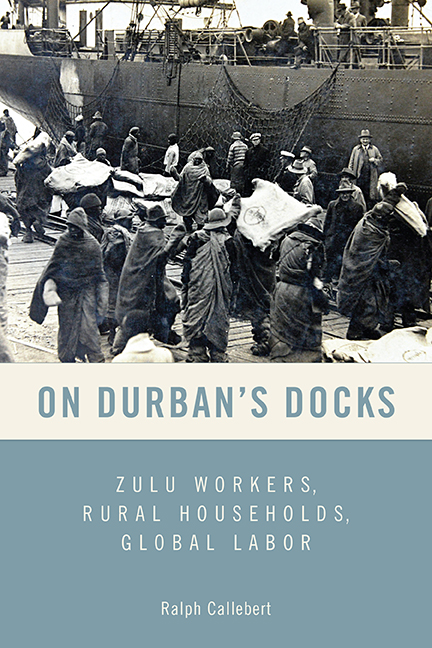Book contents
- Frontmatter
- Dedication
- Contents
- List of Maps
- Acknowledgments
- Abbreviations
- Introduction: Dock Workers in South African History
- 1 Dock Workers and the City, 1910s to 1950s
- 2 One Head of Cattle Named Salt, Another Named Beans: Livelihood Strategies in the 1950s
- 3 Work and Life between the City and the Countryside
- 4 My Children Never Went to Bed Hungry: Gender, Households, and Reproductive Labor
- 5 Cleaning the Wharves: Pilferage, Bribery, and Informal Trade
- 6 Buffaloes on Noah’s Ark: Reimagining Working-Class History
- Conclusion: Durban’s Dock Workers in Global Perspective
- Epilogue
- Notes
- Glossary
- Bibliography
- Index
3 - Work and Life between the City and the Countryside
Published online by Cambridge University Press: 29 May 2021
- Frontmatter
- Dedication
- Contents
- List of Maps
- Acknowledgments
- Abbreviations
- Introduction: Dock Workers in South African History
- 1 Dock Workers and the City, 1910s to 1950s
- 2 One Head of Cattle Named Salt, Another Named Beans: Livelihood Strategies in the 1950s
- 3 Work and Life between the City and the Countryside
- 4 My Children Never Went to Bed Hungry: Gender, Households, and Reproductive Labor
- 5 Cleaning the Wharves: Pilferage, Bribery, and Informal Trade
- 6 Buffaloes on Noah’s Ark: Reimagining Working-Class History
- Conclusion: Durban’s Dock Workers in Global Perspective
- Epilogue
- Notes
- Glossary
- Bibliography
- Index
Summary
Velile Goba started working on the docks at a more mature age than did most dock workers. He was twenty-nine when he first came to Durban in 1954. His father's umuzi in uMzimkhulu was largely self-sufficient, and there was thus no urgent need for him to supplement the homestead's income. However, he wanted to have his own money and be independent from his father. His uncle asked an induna to hire him as a stevedore. He was also offered the option of working as a domestic laborer in the house of one of the white supervisors on the docks, but he preferred the much better-paid dock work. He lived and ate in the compound and could thus save most of his wages. Moreover, his mother and his wife grew chili peppers at home, and he sold these on the docks. Later on, he also started selling cigarettes after his customers asked for them, but he never expanded his trade into the rural areas.
Saving most of his wages and earning some money on the side eventually allowed Velile Goba to pay ilobolo and to establish his own umuzi. His wife continued to grow some produce on their land but not enough for the household to live off. Nevertheless, he always remained committed to returning to his rural homestead. He had no interest in city women and did not extensively socialize in Durban, not even with his abakhaya. All his time was taken up by either working on the ships or hawking his goods. He did manage to go home every few weeks, and he socialized there: he went to parties, drank beer, ate meat, and danced. He continued to work on the docks for more than thirty-five years until 1990, when he was sixty-five. He did not want his sons to follow in his footsteps, as dock work was too grueling and too dangerous, and many izinduna used abusive language. He therefore made sure that they could go to school and land a better job.
As Velile Goba asserted, dock labor was and, despite many improvements in workplace safety, remains arduous and unsafe. Common experiences of exploitation and (both physical and socioeconomic) insecurity, as well as the use of work gangs, engendered among workers a sense of solidarity rooted in the workplace.
- Type
- Chapter
- Information
- On Durban's DocksZulu Workers, Rural Households, Global Labor, pp. 67 - 85Publisher: Boydell & BrewerPrint publication year: 2018

